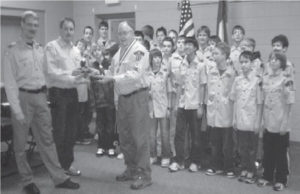Eagle’s Nest Program on The Move
New Patch to identify Eagle’s Nest participants

A new patch (See Picture) has been developed to identify. The leaders and scouts that are part of the Eagle’s Nest program. This is a very distinctive patch and boldly tells what the program is all about — Troops helping other Troops.
There are many troops that are well established and have the leaders and skills to work with another troop. We’ll help you get started and give you support in getting a mentoring program going.
Troop 32 Is The Newest Eagle’s Nest Troop

Troop 32, located at and sponsored by the Salvation Army, is the newest troop in the Eagle’s Nest program. Paul Yang is a Neighborhood Guide with the Northern Star Council and is currently serving as Scoutmaster. Troop 32 meets at the Salvation Army on Payne Avenue on St. Paul’s Eastside and is supported by adult leaders from Troop 71 in Woodbury as part of this mentoring and support program developed by the College of Wilderness Knowledge of the Pine Bend Association. The Troop 71 adult leaders, especially Dave Skinner, attend the Troop 32 meetings and help with leading the advancement program and in setting up camping weekends. They also encourage scouts and leaders from Troop 32 to attend Troop 71 scout meetings and participant in their advancement programs.
Reprinted from April 2008 Navigator
Eagle’s Nest: Troop 67 Takes On A Mentoring Role
Reprinted from the Northern Star Council Navigator
August 2008

Troop 67 sponsored by Nativity of Our Lord parish in St. Paul’s Macalester Groveland neighborhood, has agreed to serve as a mentor troop in the Eagle’s Nest program. They have started by assisting in starting a pack at St. Agnes. This will follow with a troop program. They are open to assisting other troops as the needs are identified and as their resources allow.
The Eagle’s Nest program has achieved encouraging results with some St. Paul inner city “at-risk” units. The merits of the concept have been proven fully. Eagle’s Nest is a valuable tool to bring a quality Scouting program to boys served by inner-city units that don’t have the history or resources (financial, supplies and leadership) that more established and well-resourced units have at their disposal.
But, “at-risk” units exist outside the inner city and include units of all races and cultures. Most new units initially don’t have Scouts and leaders with Scouting and leadership skills, and a strong unit suddenly may become weaker due to changes in leadership and membership. So, every District Committee should understand that they can have “at-risk” units, grasp the potential of the Eagle’s Nest, and be prepared to implement the Eagle’s Nest to help “at-risk” units.
Eagle’s Nest seeks to make all units better, not merge an at-risk unit into a mentor unit, either officially or by raiding since there usually are reasons for separate units that a merged unit won’t address.
A mentor unit’s two most important acts are to help the at risk unit and avoid raiding its Scouts and leaders. Sharing camping trips, training events, and resources helps build scouting traditions
